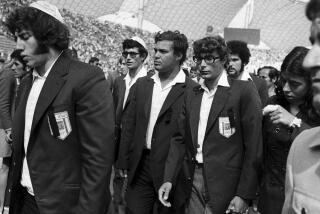Blair, Following Bush, Agrees to Inquiry Into Iraq Intelligence
- Share via
LONDON — Prime Minister Tony Blair, following in the footsteps of President Bush, agreed Tuesday to have a special commission look into intelligence failures that might have given British officials an exaggerated view of the threat posed by Saddam Hussein’s Iraq.
But Blair, appearing before a parliamentary committee, was adamant that the new investigation be confined to intelligence matters and not reexamine the broader question of how the government used its information and the controversial decision to go to war alongside the United States.
Last week’s disclosure by the United States’ former chief weapons hunter in Iraq, David Kay, that the much-discussed weapons of mass destruction in Iraq probably had not existed at the start of the war last March has caused embarrassment on both sides of the Atlantic.
Now Blair, echoing the Bush administration, says the government acted on good faith using available information, and the problem therefore lies with its intelligence services.
It was a delicate dance for Blair, who only last week was exonerated by a senior judge, Lord Brian Hutton, of charges that his government had “sexed up” intelligence to make the case for war to the public.
Speaking in Parliament, Foreign Secretary Jack Straw listed three defined areas for the new inquiry: available intelligence about weapons of mass destruction and arms trafficking, the state of intelligence on the eve of the war and discrepancies between what was expected before the war and what was later found.
The government had wanted six members on the commission -- three retired experts and one member from each of the three main political parties to give it a nonpartisan cast.
But the leader of the Liberal Democrats -- the smaller opposition party -- refused to join if the political decision of the government to go to war was deemed off-limits to the inquiry.
Straw compared the new commission to one created after the 1982 Falklands war, which examined why Britain was caught unawares by Argentina’s invasion of the south Atlantic islands.
Like that commission, the new panel will meet in private and then publish its findings without revealing any government secrets.
In contrast to a bipartisan investigating committee announced by Bush on Monday, the British panel is to announce its conclusions by July. That would put any damaging disclosures for Blair’s government well in advance of parliamentary elections, expected in 2005.
The U.S. committee will report its findings after November’s presidential election.
Liberal Democratic spokesman Menzies Campbell said his party rejected the terms laid down for the commission because Blair and others should “submit to scrutiny of their competence and their judgment” in the lead-up to the war.
Blair, appearing before a parliamentary committee, said it was important to keep the inquiry narrowly focused on intelligence problems.
“We can’t end up having an inquiry into whether the war was right or wrong,” he said.
“That is something that we have got to decide. We are the politicians.”
As recently as last week, Blair was holding out hope that the Iraq Survey Group would find evidence of weapons of mass destruction. After the U.S. congressional testimony of Kay, the recently resigned leader of the group, Blair appeared to have no alternative but to follow the example of Bush to name a committee to study intelligence failures.
Blair was unapologetic in his 2 1/2-hour parliamentary testimony and repeatedly defended the decision to go to war.
“I think we’ve done the right thing, not just because Iraq was a dangerous place under Saddam but also because the rest of the world needs to know that this issue will be tackled with firmness,” he said.
He also said that Kay’s conclusions have been mischaracterized.
“What is true about David Kay’s evidence, and this is something I have to accept as one of the reasons why I think we now need a further inquiry ... we have not found stockpiles of actual weapons,” Blair said.
“What is untrue is to say that [Kay] is saying that there was no weapons of mass destruction program or capability, and that Saddam was not a threat.”
Blair’s political rivals seemed to be enjoying the prime minister’s predicament.
Conservative lawmaker Michael Ancram lauded Blair for an “impressive” U-turn.
Liberal Democratic leader Charles Kennedy said there was a need to restore public trust.
“There is now widespread public disbelief about the stated reasons for our participation in the war in Iraq,” Kennedy said. “The way to reestablish trust would be to have an inquiry which addresses the key questions directly and openly.”
Janet Stobart of The Times’ London Bureau contributed to this report.
More to Read
Sign up for Essential California
The most important California stories and recommendations in your inbox every morning.
You may occasionally receive promotional content from the Los Angeles Times.









